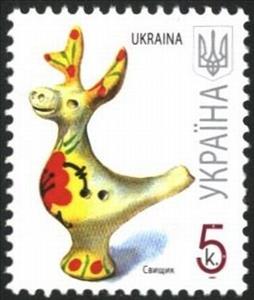Stamp: Whistle-toy (Ukraine 2007)
Whistle-toy (Ukraine 2007)
16 March (Ukraine ) within release Definitive issue goes into circulation Stamp Whistle-toy face value 5 Ukrainian kopiyka
| Stamp Whistle-toy in catalogues | |
|---|---|
| Michel: | Mi:UA 832I |
Stamp is vertical format.
microlettering under face value - 2007Also in the issue Definitive issue:
- Stamp - Whistle-toy face value 5;
- Stamp - Kumanets (stoneware for water) face value 2;
- Stamp - Mug face value R;
- Stamp - Rag-doll face value P;
- Stamp - Clay Bull face value Ж;
|
Data entry completed
90%
|
|
|---|---|
| Stamp Whistle-toy in digits | |
| Country: | Ukraine |
| Date: | 2007-03-16 |
| Size: | 22 x 26 |
| Perforation: | comb 13¾ |
| Format: | Stamp |
| Face Value: | 5 Ukrainian kopiyka |
| Print run: | 15000000 |
Stamp Whistle-toy it reflects the thematic directions:
A toy or plaything is an object that is used primarily to provide entertainment. Simple examples include toy blocks, board games, and dolls. Toys are often designed for use by children, although many are designed specifically for adults and pets. Toys can provide utilitarian benefits, including physical exercise, cultural awareness, or academic education. Additionally, utilitarian objects, especially those which are no longer needed for their original purpose, can be used as toys. Examples include children building a fort with empty cereal boxes and tissue paper spools, or a toddler playing with a broken TV remote control. The term "toy" can also be used to refer to utilitarian objects purchased for enjoyment rather than need, or for expensive necessities for which a large fraction of the cost represents its ability to provide enjoyment to the owner, such as luxury cars, high-end motorcycles, gaming computers, and flagship smartphones.
A craft or trade is a pastime or an occupation that requires particular skills and knowledge of skilled work. In a historical sense, particularly the Middle Ages and earlier, the term is usually applied to people occupied in small scale production of goods, or their maintenance, for example by tinkers. The traditional term craftsman is nowadays often replaced by artisan and by craftsperson.
A tradition is a system of beliefs or behaviors (folk custom) passed down within a group of people or society with symbolic meaning or special significance with origins in the past. A component of cultural expressions and folklore, common examples include holidays or impractical but socially meaningful clothes (like lawyers' wigs or military officers' spurs), but the idea has also been applied to social norms and behaviors such as greetings, etc. Traditions can persist and evolve for thousands of years— the word tradition itself derives from the Latin word tradere literally meaning to transmit, to hand over, to give for safekeeping. While it is reportedly assumed that traditions have an ancient history, many traditions have been invented on purpose, whether it be political or cultural, over short periods of time. Various academic disciplines also use the word in a variety of ways.



